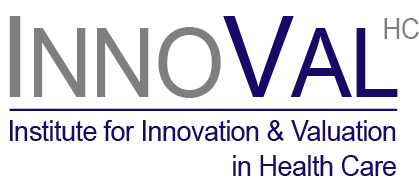SwissHTA Consensus Project
SwissHTA demonstrates the possibility of developing a multi-stakeholder consensus on the objectives, processes, and criteria of Health Technology Assessments (HTAs) at the national level.
The Swiss HTA project was initiated by senior representatives of the Swiss sick funds (santésuisse and Helsana) and the pharmaceutical industry (Interpharma and Roche) jointly with Professor Michael Schlander (InnoValHC and University of Heidelberg) at a meeting in Zurich on 12 July 2010, following intense discussions during the first half of 2010. The agreed framework and the project objectives were put in writing in a working paper entitled “Objectives of the project – ‘Assessment of medical interventions in social health insurance: development of a Swiss consensus’” dated 21 July 2010. This document is publicly available with InnoValHC Policy Paper No. 18.
On this basis, further Swiss stakeholders were invited to collaborate. This led to a project team made up of Christian Affolter (santésuisse, the national association of sick funds), Thomas Cueni (Interpharma, the federal association of the Swiss research-based pharmaceutical industry), Pius Gyger (Helsana), Ansgar Hebborn/Claude Cao (Roche), Daniel Herren (Swiss Medical Association, FMH), Stefan Kaufmann (santésuisse), Heiner Sandmeier (Interpharma), Michael Schlander (InnoValHC and University of Heidelberg), Peter Suter (Swiss Academy of Medical Sciences, SAMW) and Andreas Faller (for the Bundesamt für Gesundheit, BAG, or Federal Office of Public Health, FOPH, with observer status). The Chatham House Rule was agreed on as the basis for collaboration in the project team built on trust.
The project work received scientific support from a Scientific Steering Committee, consisting of Michael Schlander along with health economics Professors Robert Leu (University of Berne) and Gérard de Pouvourville (ESSEC, Paris).
SwissHTA was officially launched with an international workshop at Kartause Ittingen (Charterhouse Ittingen) on November 05/06, 2010.

International Workshop
Objectives of Health Technology Assessments (HTAs): Public expectations, societal preferences, and current evaluation methodsThe core of the project work was formed by two workshops and seven retreats of the project team.
While taking into account scientific knowledge in the field of health economics, the process reflected both the basic normative and institutional / legal conditions and also the specific Swiss health care environment and documented social preferences of the Swiss population.
Furthermore, where applicable, attention was paid to the further development of evaluation methods, and directions for their future evolution were outlined.
Path To Consensus
Objectives, Evaluation Process & Methods, and ImplementationEssential features of the SwissHTA Consensus include in particular:
- Clear separation of assessment, appraisal and decision-making;
- Transparency of process, criteria and decisions, including their underlying reasons, with defined timelines and broad stakeholder involvement, for new and existing technologies;
- Operationalization and consistent systematization of the criteria of the Swiss health insurance act (KVG) for efficacy, suitability and cost-effectiveness;
- Practice-oriented application of the principles of evidence-based medicine taking into account the relevance and scale of clinical therapeutic effects, the degree of trust in the existing data based on the available level of evidence in relation to the best level of evidence to be expected in the given context and the quality of the existing studies;
- Focus on the expectations (“social preferences”) of insured people within the limits of normative standards in the sense of Swiss legal tradition;
- Assessment of cost-effectiveness without normatively problematic reductionist simplifications, such as threshold values for acceptable cost-effectiveness regardless of context;
- Setting of limits at several levels (added benefit, suitability, cost-effectiveness) without being detrimental to innovation;
- Consideration of further development opportunities in the future.
Key elements of the consensus were presented at the European ISPOR (International Society for Pharmacoeconomics and Outcomes Research) Meeting in Berlin, Germany, November 2012; please see here for abstract and presentation.
More detailed information on the Results of SwissHTA can be found in the following documents:
- Full Project Documentation [Discussion Paper No. 15]
- Cornerstones / Eckpunkte-Papier [Discussion Paper No. 17]
- Appendix to Cornerstones / Anhang zum Eckpunkte-Papier [Discussion Paper No. 16]
- Cornerstones for Further Development of HTA in Switzerland [Discussion Paper No. 18]
Guiding Principles of SwissHTA were summarized in English and German language:
- SwissHTA Guiding Principles [Discussion Paper No. 19]
- SwissHTA Guiding Principles / Leitsätze [Discussion Paper No. 20]
In addition, SwissHTA issued 6 Implementation Papers, addressing:
- Implementation Paper 1: Institutional Context [Discussion Paper No. 21]
- Implementation Paper 2: Specific Recommendations for Early («rapid») HTAs [Discussion Paper No. 22]
- Implementation Paper 3: Specific Recommendations for Full («complete») HTAs [Discussion Paper No. 23]
- Implementation Paper 4: Links to Swiss Health Insurance Law («WZW Criteria») [Discussion Paper No. 24]
- Implementation Paper 5: Benefit Assessment [Discussion Paper No. 25]
- Implementation Paper 6: Efficiency and Economic Viability [Discussion Paper No. 26]


